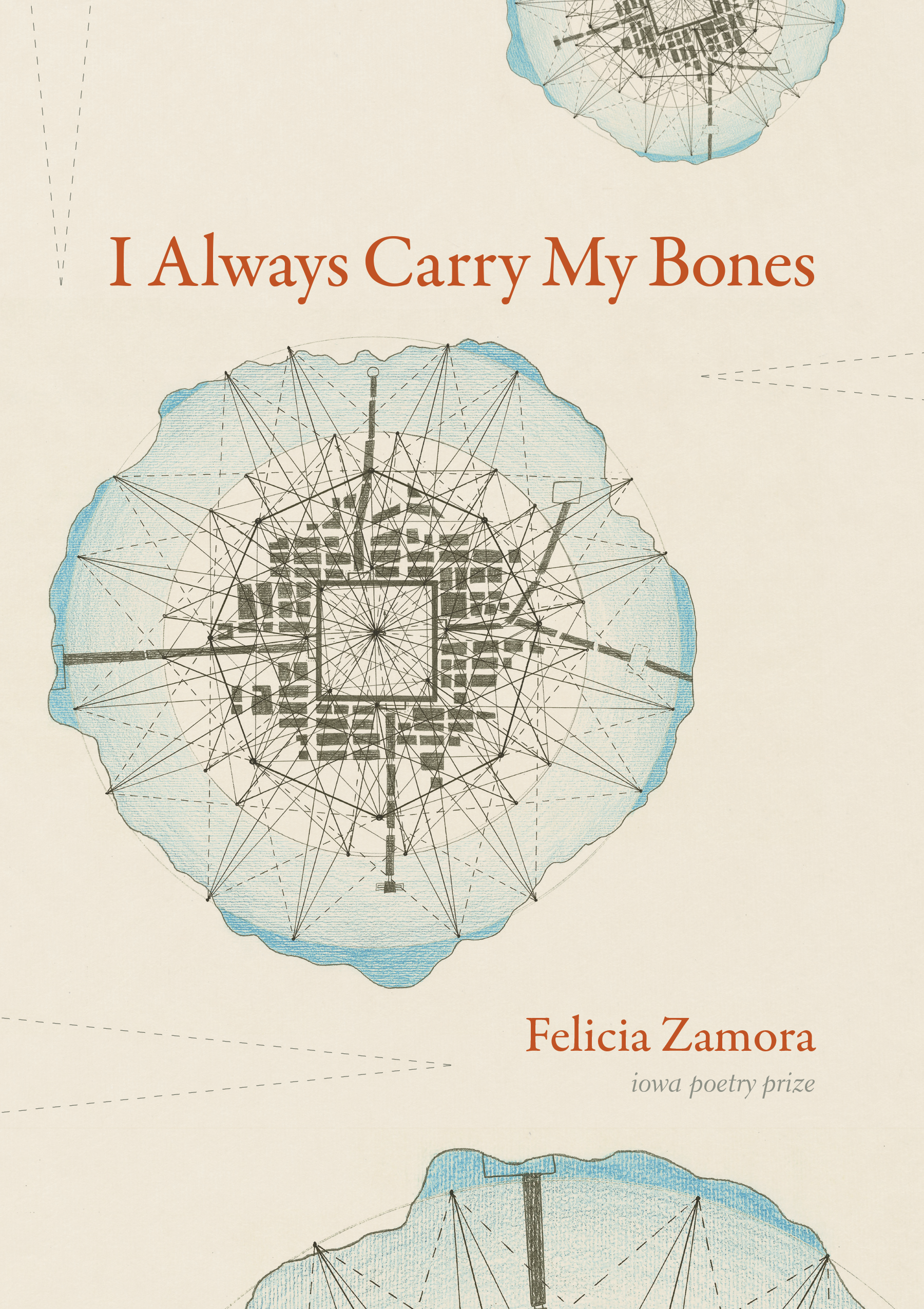Interstitial Archaeology
Wisconsin Poetry Series
University of Wisconsin Press
April 2025
“Interstitial Archaeology is all-consuming. It’s a marvel. Sometimes, a poetry collection feels like inhabiting the vast and intricate estate of a person’s imagination, as if entering a cathedral, where the saints, captured in stained glass, are the chalk-outlined martyrs haunting our newsfeeds. Felicia Zamora incorporates all knowledge: math, myth, and memory, from Emerson to Audre Lorde. The poetic forms included here are like a collection of fragments from a lost city. This book is impossibly good. These poems are both grounded and otherworldly. Prepare yourself. Eat a big breakfast and pack a lunch. This book is a journey.”
—Amaud Jamaul Johnson, author of Imperial Liquor
Quotient
Tinderbox Editions
March 2022
"Quotient is a celebration of codes that make up our world: DNA, language, geometry, Fibonacci, song, rhizomes, the “lovely legerdemain” and arithmetic of the body. Do you remember /in radiolarian, the images / etched in microscopic minerals? / Once you were a butterfly, Zamora muses; reminding us of the beauty in pattern, how each coil builds upon the next, how each mathematical sequence of our existence is a kind of quotidian magic; her poems act as microscopes fitted to the eye of the reader. A book of revelations, Quotient looks past death, destruction, grief—focuses instead on the miraculous echo of tree rings, “& loss / is loss no more”—with an intensity and tenderness that catch like a sob of joy in the throat.”
—Deborah A. Miranda, author of Bad Indians: A Tribal Memoir and Altar for Broken Things
I Always Carry My Bones
University of Iowa Press
April 15, 2021
“How do we speak out of the dust inside we will become?’ Zamora asks, and the answer is bit by bit, poem by stunning poem. Through personal histories (hers and ours), coyotes, and language at times lush as moons and at times sober and simple as daylight, Felicia Zamora—one of my favorite poets—drags America to the desert and takes America to task, survives it, destroys it, renames it, and it’s a blessing for our own weary brown to bask in what she’s done and learned with the carrying of her own.”
—Danez Smith, National Book Award Finalist
Body of Render
Red Hen Press
April 21, 2020
“Language is action in these poems, which are utterances of pleading, fighting, and mending in an America we can hardly stand to look at straight on. Body of Render is a book of saying what must be said: “say Capitol Hill be voice of all your people, be just; in haunt, you must be voice, must.” The risks Felicia Zamora takes with form, syntax, and breath pay off in poem after poem—and make Body of Render one of the most dynamic, most transformative collections I’ve read in years.”
—Maggie Smith, author of Good Bones
Instrument of Gaps
Slope Editions 2018
“In Instrument of Gaps, Felicia Zamora opens new windows into the idea of the speaker in poems of passion, of prayer, and of hope. In her work, “to believe in combustion we must believe in embers,” and she brings this to bear in a history of capturing life inside memory. Zamora marries a sharp diction with a transcendental power to enact the dynamic interplay between what is inside and what is outside the lyric in this thrilling third collection from Zamora.”
—Carmen Giménez Smith, author of Be Recorder
& in Open, Marvel
Parlor Press/Free Verse Editions 2017
“With taut attention, Felicia Zamora witnesses wonders that would break open a heart. This is a book that makes me want to live more fully in our marvelous world.”
—Camille T. Dungy, author of Trophic Cascade
Of Form & Gather
University of Notre Dame Press 2017
2016 Andrés Montoya Poetry Prize Winner
Of Form & Gather marks the dazzling debut of Felicia Zamora, whose poems concern themselves with probing questions, not facile answers.
“Dear whisperers, dear wombs, dear promises, dear leaves, dear bones, dear sparrow-shadows, dear you—Felicia Zamora has written all of you a book of poems, a book of togetherness, a book of to-gather-ness. Here the world in all its dark phenomenal vitality digs down into the ‘distinct separation felt between clauses’ and there takes root, and there too the ghosts and the animals speak, and every distance reveals itself as a link. Charting out circles and cycles and containments, these poems also become that complicated mirror that doesn’t simply reflect us back to ourselves, but as all that is not exactly us, where the body goes animal, goes vegetal, ‘& mind becomes becomes becomes’”
— Dan Beachy-Quick, author of gentlessness
“Felicia Zamora’s Of Form & Gather is a sustained, attentive, meditation on an ancient problem in the philosophy of art: the relation of parts and wholes. She writes ‘We were made to be made up of’ as her book explores the myriad ways our words, thoughts, and very cells are ‘in’: within, instilling, in motion, inhabiting, inside, in ellipsis, believing in, and beginning: ‘If you trace anything back to origin,’ she writes, ‘—more trails, more fingerprints, more quiet notes hanging on lines of pages/ in wait of instrument, a baton to lift.’”
— Susan Stewart, author of The Poet’s Freedom and Cinder







